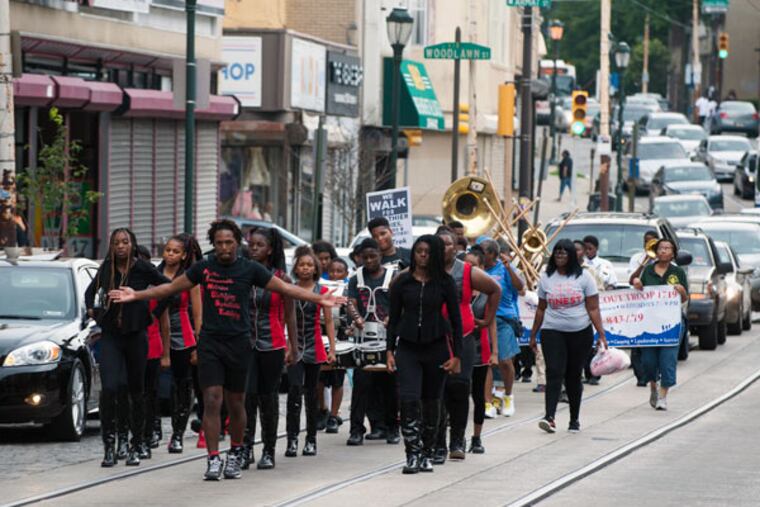Charleston casts shadow over Philly Juneteenth
In the shadow of Charleston, scores gathered in Germantown on Saturday to celebrate the events of a day 150 years ago - the freeing of slaves on American soil.

In the shadow of Charleston, scores gathered in Germantown on Saturday to celebrate the events of a day 150 years ago - the freeing of slaves on American soil.
People met near the spot where the first protest against slavery was written, joined a loud, drum-banging march up and down hilly Germantown Avenue, and fell silent at emotional reenactments of the plight of those who had been held in servitude.
They called out the names of ancestors and remembered those whose names have been lost.
None could ignore the irony that on a Juneteenth holiday to celebrate the end of slavery, families in South Carolina were preparing to bury nine African Americans shot to death in their church.
"I especially wanted to remember them," said Iraina Salaam, who led the calling of names.
Juneteenth, a contraction of "June 19," originated in 1865 in Texas and remains the oldest known commemoration of the end of slavery. This year also marks the 150th anniversary of the passage of the 13th Amendment, which enshrined abolition in the Constitution.
The killings in Charleston, S.C. - where a racist manifesto attributed to accused shooter Dylann Roof surfaced Saturday - resonated in Germantown, home to a rich antislavery history.
A Germantown meetinghouse gave rise to what is said to be the first protest against slavery in the United States, signed in 1688. A house that was a stop on the Underground Railroad still stands, open for visitors.
On the avenue Saturday, as children played in a bounce house and elders listened to a jazz band, Christopher Collins Sr. was angry.
"They should have walked him back to the church, let him see what he done, and shot him in the head," Collins said.
Others saw it differently.
"It's not about hate. It's about forgiveness," said Kevin Harrell, at the event with his wife, Charlmayne, and 2-year-old son, Maaz.
Some struggled to find words for the tragedy.
"This is devastating on so many levels," said Trapeta Mayson, executive director of Historic Germantown, a partnership of 16 museums, homes, and cemeteries.
Joseph Lee, dressed in a Union Army uniform as part of a unit that portrays the Third and Sixth United States Colored Troops in reenactments, said the shootings felt personal: "Nine people slaughtered in the church - that hurts."
The ties between Philadelphia and Charleston go back 200 years, including a close association between Mother Bethel A.M.E. Church in Society Hill and Emanuel A.M.E. Church, scene of Wednesday's shootings
In the early 1800s, so many wealthy South Carolina planters came to Philadelphia that the city boasted a "Carolina Row" on Spruce Street. The growers' slaves were sent here, too, serving masters who sought to escape the South's summer heat.
"It became famous as a social center where conservative Americans and Europeans could gather for conversation and entertainment," Daniel Kilbride wrote in An American Aristocracy: Southern Planters in Antebellum Philadelphia.
During the Civil War, Germantown families of German descent often had sons fighting for the Union, while many English families had sons in the Confederate army.
Juneteenth springs from the end of that war, and from a time when news traveled slowly to the states.
Two months after the South surrendered, Union soldiers led by Maj. Gen. Gordon Granger landed at Galveston, Texas. He read aloud a public proclamation: "The people of Texas are informed that, in accordance with a proclamation from the Executive of the United States, all slaves are free."
Many who listened to Granger had never heard of the Emancipation Proclamation, issued two years earlier by President Abraham Lincoln. Six more months passed before the 13th Amendment was ratified.
Today Juneteenth activities take place around the country, often including speakers and prayer services. Germantown marked its sixth annual celebration, where children playfully "jumped the broom," hopping over a bristled broom to reenact the marriage ceremony for slaves who could not legally wed.
"At times when people, black and white, say, 'That was so long ago; why keep talking about it today?' my response is that's a part of history that you'd like to forget, but you shouldn't forget," said Cornelia Swinson, executive director of the Johnson House, the 1850s Underground Railroad stop. "The struggle for freedom is never over."
215-854-4906@JeffGammage